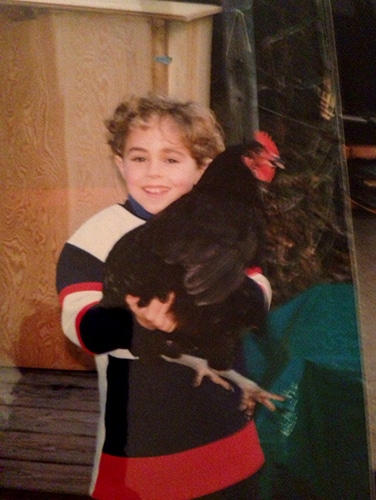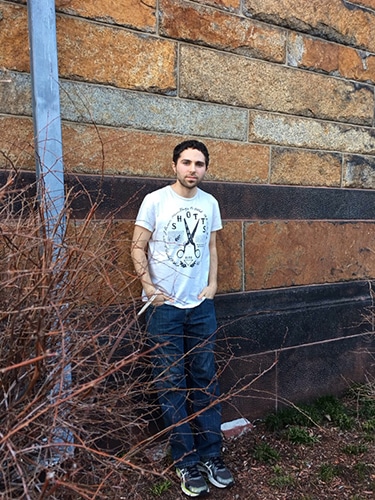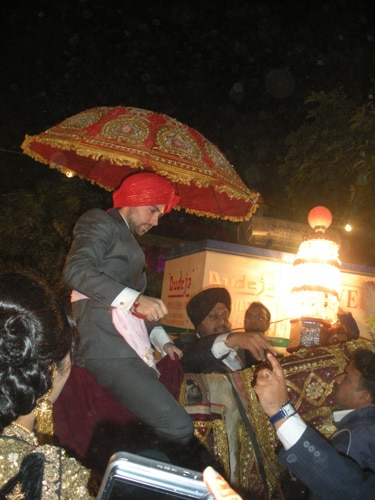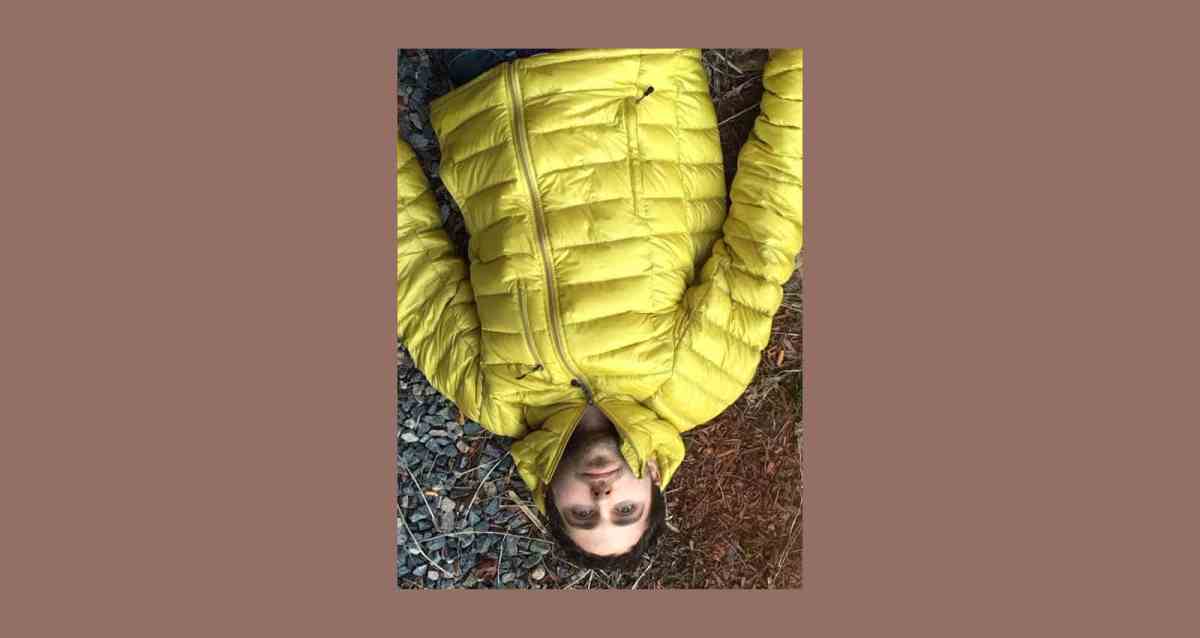For Intro, we speak with the musicians who don’t show up in press releases. We hope to portray a diversity of background and experience in classical music. This is the first interview in an ongoing series.
Andrew Trovato is a pianist, composer, and childhood friend. In the course of two long Skype sessions—he was lying on the couch in his Brookline, Massachusetts apartment—we covered trauma, illegal poker games, and his belatedly won, hard-earned passion for making music.
VAN: Can you tell me a little about your early childhood?
Andrew Trovato: I lived in Cape Cod until I was six. When my parents split up, I moved to Brookline with my mother.

What kind of things were you into as a kid?
I switched hobbies every few weeks; nothing captured my interest for too long. I started skateboarding, and I skateboarded for a while, but I knew that wasn’t really too meaningful in my life.
Do you come from a musical family?
No… I was never encouraged or pushed to learn music.
What was your upbringing like more generally?
The environment in my family was very traumatic—there was a lot of fighting. I was diagnosed with PTSD from when my parents were together in my childhood. Coming from that environment and realizing, at a young age, that anxiety and fear for my own safety could come from my own family—that made me realize that things aren’t always as they should be.
So how did you get started playing music?
The first music that grabbed me was the Beatles. I was exposed to them for the first time when I was around 14 or 15. After that I started singing in the choir in high school, to learn how to sing better. Through the choir I was exposed to notation, and classical music; and I remember the first time I listened to Chopin, it just melted all this anxiety I had. It felt like I was coming home to something I was meant to do.
Any first impressions of the classical music world?
Looking from the outside in at classical music, you assume that everyone has to be a child prodigy, brought up from a young age playing music and supported by all these people, and I didn’t have any of that.
What was it like starting piano at that age?
When I first started I didn’t want to learn any scales or any technique, I just wanted to learn the pieces I liked. And because I had some kind of ability to play the pieces that I wanted, my teacher let me get away with that.
I remember that you started to compose around that time, too. You would show me your pieces at your place or at friends’ houses…How did you go about writing back then?
I would just wait for inspiration to come. I used to think that all the masters were geniuses who heard things and just transcribed them. I thought that they didn’t have to work hard because they were almost godly beings. So when I wasn’t feeling inspired, I would just stop for a while and wait.
And what would you do when you were waiting for inspiration?
I don’t know, just mess around with my friends, do stupid stuff, get into trouble, not go to school.
One Sunday in high school, I was sitting in a youth orchestra rehearsal when I received a call from Andrew’s mother. He had been hospitalized due to mental issues. I hadn’t noticed that anything was wrong; maybe nothing really was. When he got out, we continued to do the same things that we did before—playing piano and listening to music in his family’s basement apartment in Brookline, along with skateboarding and some mild underage drinking.
Can you tell me about your stay in the hospital—I think it was 2006 or 2007—for mental issues? What was wrong?
I don’t think I actually had any real mental issue. Though I do tend to have up periods and down periods, in terms of my mood. Of course, at the hospital the solution was medication. They stop your creative thinking to make you able to go through the motions of daily life. When I was eventually forced to go on the medication, I felt like I was dulled down. Within a month or two, I couldn’t hear music anymore. So I stopped taking the meds—they made me feel like a zombie.
The latest from VAN, delivered straight to your inbox
Would you feel comfortable telling me what the official diagnosis was?
They said it was possibly depression or maybe a little bit of Type Two Bipolar Disorder. That’s not what it turned out to be, though.
What happened after you got out?
Before I could go back to normal high school, I was sent to his place that was half hospital, half school. There were a lot of interesting kids there. A lot of them were highly emotional, but they weren’t crazy.
Anyway, then I went back to the high school, and was told that I missed too much school and would be held back a year. I didn’t want to learn about whatever they were teaching in high school. I wanted to compose and make music, that was it. So I dropped out of high school, and I decided to leave and go to conservatory.
How old where you when you left to go to conservatory (at Codarts, in Rotterdam, Holland)?
I was about 19.

Andrew composes music that is harmonic and often melodic in a traditional sense. At the Austrian school I attended, that style was relegated to the music theory department, where several composers took lessons. They had little contact with the “contemporary” composition students, and were treated patronizingly. It was a big leap from our musical education in high school—where Andrew and I shared a fatherly composition teacher, Justin Casinghino, whom we nicknamed “Papa Cas”—to conservatory in Europe.
We talked to each other a lot when we were both at conservatory in Europe. How would you describe your experience now, with the benefit of hindsight?
I went to a conservatory where post-World War II avant-garde music was very important; we never talked about anything before Debussy. When I heard music by Stockhausen or Boulez, I somehow felt like I was being attacked. I wrote some pieces while I was there that I kept secret. I was afraid they wouldn’t be received well because they were tonal.
I started sleeping in really late; I couldn’t really do anything consistently. I would miss school sometimes, and I was very up and down. In Holland, the casino was basically right next to my school. My first year there I spent a lot of late nights in the casino, gambling and playing poker. It was similar to what I had done before in high school, almost running away. I could be very oppositional and stubborn.
I ended up leaving school after the first year and taking a year off in the U.S. But I decided after the end of that year that I wanted to go back to conservatory and figure out whether it was right for me. I had the feeling that I wasn’t someone who completes things, or that I wasn’t a responsible person, since I had dropped out of high school. A lot of my problems in Holland came from that feeling. Still, in the second half of my second year there, I realized that I had to leave.
What was it like sitting down to compose after that?
After that first year I became self-conscious while I was writing. I was unable to compose for two years because I was still so traumatized and sensitive. I traveled to India a couple times. It took about two years of me just figuring myself out, working a bit, living a real life, to be able to start practicing and writing again.

For a long time, I’ve known that you’re involved with poker games in Boston. I think I remember waiting in the car in Allston sometimes while you went in and talked to the organizers…
Well, I’ve always had these two worlds that I live in. When I was about 16 I started playing in underground poker games in Boston—in Massachusetts, poker and gambling are illegal, so they have these underground games. I became friends with a lot of the people who run the games, and when I came back I eventually started working at them to make some money. There were four video cameras pointed at the door, which was bolted, and I was watching to see who was coming in, and whether anyone was on the stairs outside. I would let people in—and out, as they lost.
And you play poker yourself, too, right?
Yeah—I have a lot of friends who play, so I’d go with them, or I’d go by myself to one of the games. I know most of the people there. You sit down and talk—sometimes about the weirdest things—with a lot of different people. The players could be anyone from criminals and drug dealers to blue-collar workers to doctors and lawyers.
I’m curious about how poker fits in with your music. Did you ever talk about classical music with the people from the poker games?
Yeah. And it was actually really nice. I was able to get a lot of people—who are from a very different world—to come to my concerts. They were able to connect with classical music because they connected to me as a human being.
Classical musicians tend to market themselves as geniuses. It’s hard for people to connect to them. And in turn, it’s hard for people to connect to classical music. They feel like they have to be better educated than they are to appreciate it. Which is not true.
Poker is very mathematical, and so is music—at least according to the cliché. Do you see a connection?
I think you can take a mathematical approach to music and poker, and I know people who do. I’ve always been skilled in math, but I prefer an emotional, intuitive approach to poker. Logic just helps me avoid huge missteps. I don’t consciously think about the chords I’m using, either.
You started conservatory again, at Longy School of Music in Cambridge, Massachusetts, this fall. How’s that going?
I really like the environment there: it’s in two old mansions, so it feels like walking into a beautiful home when you go to school. The classes are very small. The teachers are very open to what you want as an artist; they respect your views; they help guide you; and they let you be free and decide what you want to do. ¶
Subscribers keep VAN running!
VAN is proud to be an independent classical music magazine thanks to our subscribers. For just over 10 cents a day, you can enjoy unlimited access to over 875 articles in our archives—and get new ones delivered straight to your inbox each week.
Not ready to commit to a full year?
You can test-drive VAN for one month for the price of a coffee.


Comments are closed.